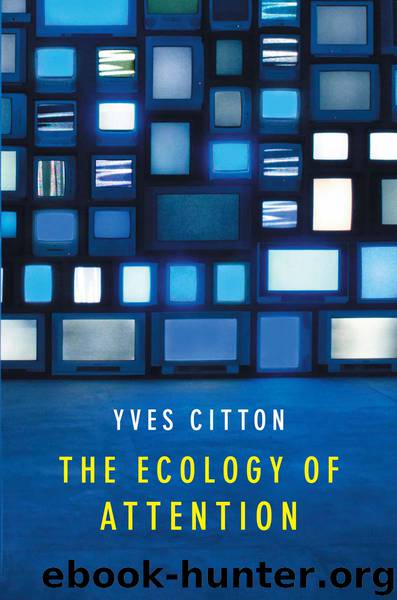The Ecology of Attention by Citton Yves;

Author:Citton, Yves;
Language: eng
Format: epub
Publisher: Polity Press
Published: 2016-12-29T00:00:00+00:00
Notes
1. On joint attention, which is a recent area of study, see Joint Attention: Its Origin and Role in Development, ed. Chris Moore and Phil Dunham (Hillsdale (Mich.): Lawrence Erlbaum Associates, 1995); Naomi Eilan et al., Joint Attention and Other Minds (Oxford: Oxford University Press, 2005); Joint Attention: New Development in Psychology, Philosophy of Mind and Social Neuroscience, ed. Axel Seeman (Cambridge (MA): MIT Press, 2012).
2. Vilém Flusser, La Civilisation des médias, p. 103.
3. In French, attentive (attentif) and considerate (attentionné) both clearly refer to attention.
4. Daniel Bougnoux, Introduction aux sciences de la communication [Introduction to the Communication Sciences] (Paris: La Découverte, 2001), pp. 71–2.
5. Robert Caron, ‘Les enfants savent déjà résister’ Les Actes de lecture, no.125, March 2014, p. 55. As well as Katherine Hayles’ article ‘Hyper and deep attention . . .’, on these questions see also Philippe Meirieu, ‘À l’école, offrir du temps pour la pensée’, Esprit, no. 401, January 2014, pp. 20–33.
6. Cathy N. Davidson, Now You See It: How Technology and Brain Science Will Transform Schools and Business for the 21st Century (New York (NY): Penguin, 2011), p. 76.
7. I am here taking up Vilém Flusser’s terms, which have already been quoted above, La Civilisation des médias, p. 103.
8. John Beck and Thomas Davenport, The Attention Economy, p. 68.
9. Michael H. Goldhaber, ‘The attention economy and the Net’.
10. John Beck and Thomas Davenport, The Attention Economy, p. 68.
11. L’Individuation à la lumière des notions de forme et d’information [Individuation in the Light of the Notions of Form and Information] (Grenoble: Million, 2005).
12. Edmund Husserl, Phénomenologie de l’attention, edited by Natalie Depraz (Paris: Vrin, 2009) p. 126.
13. Jacques Rancière, Le Maître ignorant. Cinq leçons d’émancipation intellectuelle [The Ignorant Schoolmaster: Five Lessons in Intellectual Emancipation] (Paris: Fayard, 1987), pp. 85–92.
14. Paul Valéry, Cahiers vol. 2, pp. 254, 268, 271.
15. Bernard Aspe, ‘Simondon et l’invention du transindividuel’ [‘Simondon and the Invention of the Transindividual’], La Revue des Livres, no. 12, July-August 2013, p. 78. The citation in quotation marks is taken from Gilbert Simondon, L’Individuation psychique et collective [Psychic and Collective Individuation] (Paris: Aubier, 1989), p. 211.
16. Steve Kolowich, ‘The minds behind the MOOCs’, The Chronicle of Higher Educaton, March 2013 (available on Chronicle.com).
17. On these experimentations and their fate in the nineteenth century, see Anne Querrien, L’école mutuelle. Une pédegogie trop efficace? [The Mutual School: An Overly Effective Pedagogy?] (Paris: Les empêcheurs de penser en rond, 2005).
18. Michael Meranze and Christopher Newfield, ‘Remaking the University’, Utotherescue.blogspot.fr.
19. We sense, however, the natural symbiosis maintained between MOOCs and the procedures of automated evaluation that have been developed since the beginning of the twentieth century in the form of multiple choice questionnaires (IQ tests, SATs, GREs and other standardized exams) – industrialized procedures which are the subject of a critique and a brief history in Cathy Davidson’s Now You See It, pp. 111–25. ‘Digitalization’ is as much rooted in the overeconomies of scale particular to industrial Taylorization as it is in the technical development of microprocessors.
20. Nicholas Carr, Internet rend-il bête?, pp.
Download
This site does not store any files on its server. We only index and link to content provided by other sites. Please contact the content providers to delete copyright contents if any and email us, we'll remove relevant links or contents immediately.
| Administration & Medicine Economics | Allied Health Professions |
| Basic Sciences | Dentistry |
| History | Medical Informatics |
| Medicine | Nursing |
| Pharmacology | Psychology |
| Research | Veterinary Medicine |
The Art of Thinking Clearly by Rolf Dobelli(9856)
The 5 Love Languages: The Secret to Love That Lasts by Gary Chapman(9231)
Mindhunter: Inside the FBI's Elite Serial Crime Unit by John E. Douglas & Mark Olshaker(8674)
Becoming Supernatural by Dr. Joe Dispenza(7812)
The Road Less Traveled by M. Scott Peck(7258)
Nudge - Improving Decisions about Health, Wealth, and Happiness by Thaler Sunstein(7220)
Mastermind: How to Think Like Sherlock Holmes by Maria Konnikova(6915)
Enlightenment Now: The Case for Reason, Science, Humanism, and Progress by Steven Pinker(6858)
Win Bigly by Scott Adams(6805)
The Way of Zen by Alan W. Watts(6273)
Factfulness: Ten Reasons We're Wrong About the World – and Why Things Are Better Than You Think by Hans Rosling(4477)
The State of Affairs by Esther Perel(4465)
Gerald's Game by Stephen King(4357)
Man's Search for Meaning by Viktor Frankl(4237)
The Confidence Code by Katty Kay(4016)
Thinking in Bets by Annie Duke(3988)
The Worm at the Core by Sheldon Solomon(3313)
Hidden Persuasion: 33 psychological influence techniques in advertising by Marc Andrews & Matthijs van Leeuwen & Rick van Baaren(3283)
Enlightenment Now by Steven Pinker(3266)
